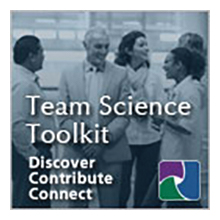|
Damayanthi (Dayan) Ranwala
Abstract: Problem: What are the specific skills or competencies that need to be developed among various members of translational science teams and at various career stages? Objectives: Building upon existing knowledge and team science competency frameworks, develop 'individual' and ‚'team-based' competencies required for all members of translational science teams to be effective team members. To provide an actionable model of specific individual and team competencies that relate to different career paths in different constituencies (such as Trainees and Faculty, Clinical Research Support Professionals, and Community Partners) important to translational science teams. To define career paths of each constituency and levels of team science competency accomplishment that they should be learning and behaviorally explicit to become effective team members. Explore other potential constituencies and frameworks through the discussion portion of the session to help inform this work.Our focus is to build upon our previous work (Individual and team competencies in translational teams by Lotrecchiano et al., 2021) to advance the field of translational science by elaborating a common framework for individual and team science competencies across the career lifespans of many key constituents of translational science teams. Traditional scientific training focuses on developing skills as a researcher and deepening domain expertise, however, translational science team members need to develop a broader set of competencies related to being a team player, communicating across diverse stakeholders, collaborating across silos and professions, and thinking in systems rather than a single field (Gilliland et al., 2019). To be truly inclusive and translational, team science education and training must be developed not only for scientists and research staff, but also for other key members of translational science teams such as clinicians, patients, community partners, funders, and other groups. Additionally, the lack of clear and consistent team science competencies creates an environment where teams are not fully supported and able to function at peak performance. The expansion of the team science competency model (Lotrecchiano et al., 2021) from a focus on training scientists to building the model for many key constituencies and across the career stages provides the opportunity to make greater and faster progress in building the capacity of institutions and teams for translational team science. This elaboration of the translational team science competency model will be used to inform 1) gap analysis of existing curriculum, 2) development of new training modules to fill gaps, and 3) expansion of team science training to new constituents. These resources build toward the larger goal of a more comprehensive resource kit for team science education and training materials, and resources that can be shared across CTSAs, SciTS affiliated members, and other stakeholders.
|

